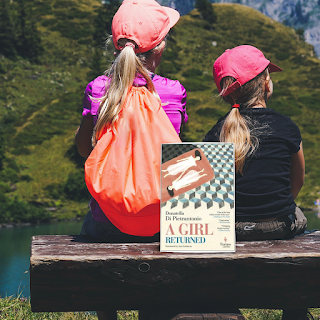A Girl Returned by Donatella Di Pietrantonio
A Girl Returned by
Donatella Di Pietrantonio ( translated by Anne
Goldstein)
SUMMARY:
Set
against the stark, beautiful landscape of Abruzzo in central Italy, this is a
compelling story about mothers and daughters, about responsibility, siblings,
and caregiving.
Without warning or explanation, an unnamed 13-year-old girl is
sent away from the family she has always thought of as hers to live with her
birth family: a large, chaotic assortment of individuals whom she has never met
and who seem anything but welcoming. Thus begins a new life, one of struggle,
tension, and conflict, especially between the young girl and her mother. But in
her relationship with Adriana and Vincenzo, two of her newly acquired siblings,
she will find the strength to start again and to build a new and enduring sense
of self.
MY REVIEW:
This is a complex portrait
of Italy that you do not see in the guidebooks. It is a powerful story and digs deep into the
meaning of motherhood, nurture and family values. I felt uncomfortable with the
tragic start to the book but I had to get to the end. We don’t know why the girl
was given up by her adoptive parents and dumped back on her birth parents. Nor
does she, so the utter sense of abandonment and alienation she experiences, is also
felt by the reader. The book takes place in the years 1975-76 when the narrator
is 13- 14 years old, a young girl on the verge of adolescence. Not
surprisingly, she remains unnamed throughout the story. Her early years were happy and privileged.
From private ballet lessons to being members of a beach club. The narrator’s
new life is of abject poverty in a neglectful and abusive household in a small
town. She has to share a bedroom with her many new siblings, including the
boys. The eldest, Vincenzo takes more than a passive interest in her developing
body. Her only sister Adriana wets the bed she shares with the narrator every
night.
The new mother is cold and
distant and expects her to take on the household chores which are completely
alien to her. She demands that she plucks a freshly
killed chicken. The girl cannot. She can
barely boil water, and it’s a challenge just to speak with this woman in the
kitchen.
My Recommendation:
This story could so easily be
depressing but it is not. The narrator is a strong character, she excels at
school and occasionally the reader gets a ‘flash forward’ into the future so we
are treated to glimpses of a happy ending. Not only is it exceptionally well
written, the author skillfully uses many techniques to test the reader’s
perception of acceptable ‘normal’ family life. There are contrasts of
characters, differences in upbringing, reflections on culture, nature and nurture.
The author challenges the nature of
motherhood and what it means to be a mother and daughter. The narrator has two
mothers and yet she feels like an orphan. True motherhood and a healthy
mother/daughter connection are about the relationship between those individuals.
Not only does the narrator experience being abandoned and mistreated by both
her mothers but the absence of effectual or impactful fathers in the book
places the emphasis on the importance of the mother/daughter relationship even
more strongly. A great read and definitely one for a book club!
AUTHOR BIO:
Born in Arsita, Donatella Di
Pietrantonio lives in Penne, Abruzzo, where she practices as a pediatric
dentist. From the age of nine she has been writing stories, fables, poems, and
novels. Her short fiction has been published by Granta Italy, and her novel,
Bella mia, was nominated for the Strega Prize and won the Brancati Prize.
BOOK BLURB:
Published by Europa Editions
(10 Sept. 2020)
Available in paperback from
Amazon
This review is also featured on La Lovely Vita





Comments
Post a Comment